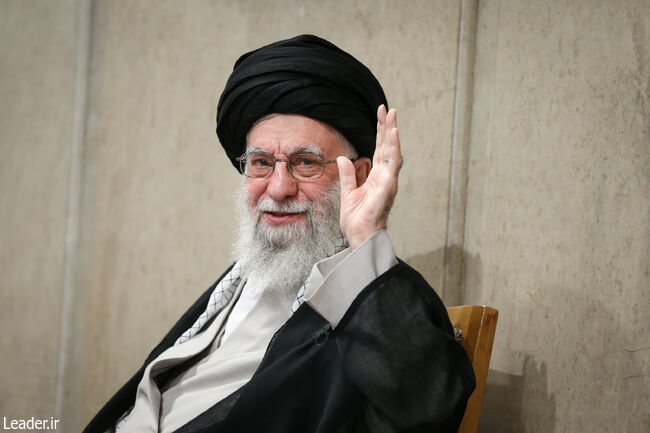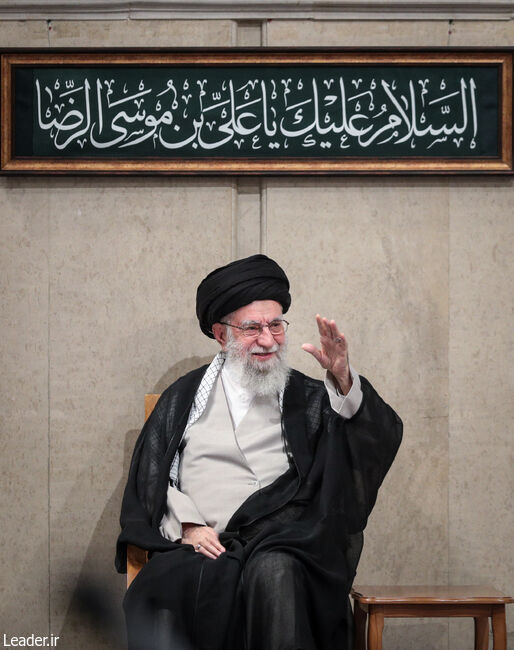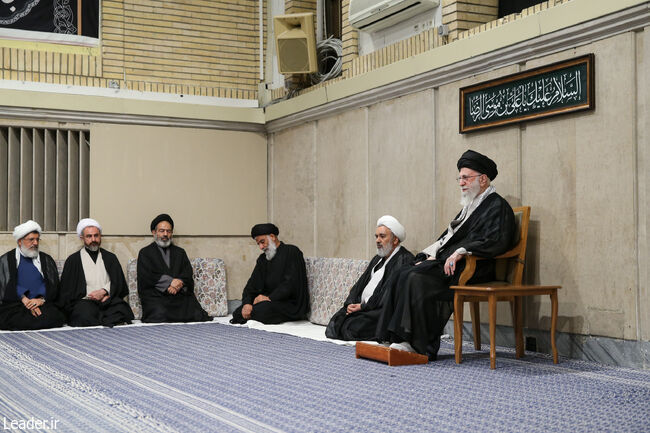The Leader of the Islamic Revolution met this morning with thousands of people from various segments of society on the anniversary of the martyrdom of the benevolent Imam, Hazrat Ali ibn Musa al-Reza (a.s.). He said that the extraordinary spread of the school of the Ahl al-Bayt and the accelerated dissemination of the issue of Ashura and the philosophy of Imam Hussain's (a.s.) uprising in the Islamic world as among the most important blessings of the Eighth Imam's journey to Khorasan.
Elaborating on key points in current issues, he said, “From the resolute resistance and powerful unity of the nation, officials, and armed forces, and from the unbearable blow they (the Zionists) suffered in our military onslaught, (showed) that the Iranian nation and the Islamic system will not be subdued and forced into obedience by war. So now, they will pursue this objective by creating discord within the country. With this in mind, everyone; officials, those with influence, and those with a voice and a pen must, with all their being, preserve and strengthen the steel shield that is the sacred and great unity of the nation.”
In the first part of his remarks, Ayatollah Khamenei referred to the Eighth Imam as the Wali-e-Ni’mat, the spiritual conduit of divine goodness for the whole world, especially Iranians. He offered condolences on the martyrdom of the Benevolent Imam, and then spoke about the profound impact the great Imam's journey had on Khorasan.
He said, “One result of that journey was that it brought the school of the Ahl ul Bayt out of the isolation and marginalization it suffered after the martyrdom of the Master of Martyrs (Imam Hussain) into the light. The Shi'a found their morale and that that morale gave the Shia the durability they have maintained over all these years and to expand the followers of the school of the Ahl al-Bayt day by day."
A second important outcome of the Eighth Imam's journey to Khorasan, he said, was the promotion of the Ashura movement. He said, “By attracting the hearts of the people towards the uprising of Ashura, Imam Ali ibn Musa al-Ridha (a.s.) posited its philosophy and goals of fighting against injustice and not tolerating the wicked and corrupt in an Islamic society, at the centre of public consciousness, thus paving the way for the presentation, clarification, and promotion of many of the social teachings of Islam.”
The second part of his remarks concerned current affairs. Ayatollah Khamenei said that the nation's steadfastness with complete strength and resolve during the "Second Imposed War" had greatly increased the respect and dignity of the Iranian people in the eyes of the world. Then he posed an important question, he asked, “What is the real reason behind the continuous hostility of all U.S. administrations toward Iran over the past 45 years?”
In response to this seemingly simple but complex question, he said, “In the past, the Americans used to conceal the real reason for their hostility by using labels such as terrorism, human rights, democracy, women’s issues, and similar matters, or they would say more diplomatically that they wanted to change Iran’s behaviour. But the person currently in power in the U.S. has revealed the true reason for the hostility when he said, “We want Iran to listen to us.” In other words, they want the Iranian nation and the Islamic Republic to be obedient to them… They want Iran, with all its great history and a nation possessing such dignity and honour, to be subservient to America.”
He described those who say that America’s anger and hostility are caused by the slogans of the Iranian nation as superficial, adding, “Those who say, 'why don't you hold direct negotiations with America and resolve these issues,' are also superficial; this is not the essence of the matter because these issues are insolvable given the true objective of America's hostility toward Iran.”
Ayatollah Khamenei called the words and actions of American officials aimed at bringing Iran to its knees and making the Iranian nation subservient, an insult to Iranians, saying, “The nation is deeply offended by such a vile expectation, and will take a firm stand against this demand.”
He identified this same sinister objective and expectation as the true cause of the recent war, adding, “"They incited and assisted the Zionist regime so that, in their own imagination, they could finish off the Islamic Republic because they did not think that the nation would stand against them and strike such a blow that they would come to regret.”
Referring to the gathering of a group of American quislings in Europe, just one day after the war began to discuss installing a government to replace the Islamic Republic, the Leader of the Revolution said, “So deluded and confident were they about the realisation of their vile goals that only one day after the attack began, they held a meeting to appoint the next government and even designated a king.”
Ayatollah Khamenei, made reference to the presence of an Iranian among that band of fools, and said, “Shame upon that Iranian who works against his own country in favour of the Jews, Zionism, and America.”
The Leader of the Revolution pointed out that the baseless notion of there being a gap between the people and the system as another delusion of the enemy and their collaborators. He said, “By standing firmly alongside the system, the armed forces, and the government, the nation struck a resounding blow to the mouths of all of them.”
He described the show of strength by the armed forces of the Islamic Republic as something that shifted the equation, adding, “We and the entire Iranian nation thank the armed forces for their great work, and from now onward, day by day, the power and capability of Iran and its armed forces shall continue to increase.”
Ayatollah Khamenei concluded that the enemy's assessment of recent events is their inability to bring Iran to its knees through war and military attack. He said, "Despite these hostilities, over the past 45 years the Islamic Republic has grown stronger every day, and the enemy has also realized that the way to push back the Islamic Republic is not through employing violent instruments and means, but rather by creating discord and division within the country."
He identified the actors creating discord and generating conflicting narratives as the domestic agents of the U.S. and Zionism inside the country, as well as unwitting speakers and writers. He added, “Today, by the grace of God, the people are united; and despite political and social differences of opinion, they stand as one in defending the system and the country and in confronting the enemy. This unity is what prevents the enemy’s aggression and violations, and it is precisely for this reason that they seek to destroy it.”
The Leader of the Revolution regarded the safeguarding of national unity as a duty incumbent upon all. He said, “He said, “H The sacred unity, the great assembly, and the steel shield of the people's hearts and resolve must not be tarnished. Preserving it is the duty of those with voice and pen, researchers, those active on social media, all the people and officials, particularly the heads of the three branches of government, who, thank God, today work together in complete unity and harmony.”
He emphasised that supporting the servants of the country was essential, and added, “The people should support the servants of the nation, including the President, who is diligent, hard-working, and persistent, for such individuals deserve appreciation.”
Ayatollah Khamenei said that the preservation of unity between the people among themselves, the people and the government, the officials of the system among themselves, and the people and the armed forces was an absolute necessity. He added, “Signs and evidence indicate that today the enemy's greatest effort is focused on undermining this consensus, solidarity, and cooperation.”
Pointing out that the existence of differing opinions on various issues posed no problems, he said, “Thoughtful individuals should note that presenting a new idea that complements the nation's existing foundations is different from tearing down and insulting. The foundations of the Islamic Republic, which have led to the nation's growth, the country's advancement and strengthening of national power, must not be undermined. The enemy desires such destruction, even though supplementing and completing the foundations is not an issue.”
The Leader of the Revolution described the Zionist regime as the most detested regime and government in the eyes of nations, remarking, “Today, even Western governments such as Britain and France, which have always supported the Zionist regime, are condemning it although these condemnations are merely verbal and ineffective.”
He described the present crimes of the leaders of the Zionist regime such as killing children by starvation and thirst and gunning them down while they stand in line for food as being unprecedented in human history. He said, “We must stand against these abhorrent crimes; however, standing up with mere words and condemnations is useless. Rather, we must act like the brave people of Yemen and make sure that all avenues of aid to the Zionist regime are cut off everywhere.”
In conclusion, Ayatollah Khamenei expressed the readiness of the Islamic Republic to take every possible action in this regard and expressed the hope that God Almighty, by blessing the movement of the Iranian nation and all justice-seeking people of the world, would uproot this deep and deadly cancerous tumour from the region and awaken and cause unity between Muslim nations.
In addition to the eulogists of the Ahl al-Bayt, attendees at the ceremony included Mr Hamid Davandi and Mr Majid Bani Fatima, who commemorated the anniversary of the martyrdom of the Eighth Imam through the recitation of Ziyārat Amīnullāh and elegiac lamentations.



